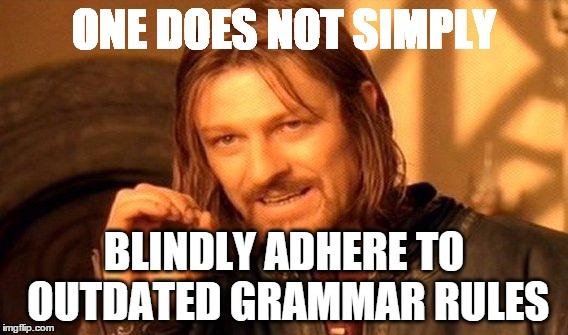There are certain grammar rules that seem to have been passed down through the generations as “thou shalt not” commandments, when, in fact, they are more “use in moderation and with intention” guidelines. Today, instead of picking a word to use, I’d like to write about one of the rules that governs how we use words, and why it’s okay to break it on occasion (and by occasion, I mean whenever you feel like it). The first rule was drummed into me by numerous English teachers over the years, and I blindly accepted it as fact, when in fact it bears more resemblance to fiction: Never end a sentence with a preposition. Switching a sentence around to ensure that you don’t break this “rule” leads to sentences that bear little resemblance to how people actually speak and think, causing overly formal, stuffy writing. Instead of the perfectly acceptable “Which team are you rooting for?” question at a Superbowl party, blind adherence to this so-called rule would have us asking “For which team are you rooting?” which isn’t horrible, but seems overly formal. There are times when changing the sentence structure to comply with this rule actually makes the sentence harder to understand. For example, “What did you write that paper for?” is a perfectly understandable sentence, while “For what [reason] did you write that paper” requires an extra word to be understood, and is very formal. Since the object of writing is to clearly communicate ideas, I’d like to propose that instead of saying “Never end a sentence with a preposition”, we change it to” Use prepositions at the end of sentences when they make grammatical sense”. So, go ahead and use a preposition at the end of a sentence, but if the sentence makes sense without the preposition, drop it. (So you don’t need to ask “Where are you at?”, because the word at is redundant. The question makes just as much sense if you ask “Where are you?”)
I did a little digging and found out that this “rule”seems to have originated in the 17th century, and not so much as a rule but as an observation on another writer’s work. Then again, the word preposition actually tells you where it should be in the sentence by virtue of the Latin words that make it up. (Looks like I will be doing a traditional explain-the-word Word Wednesday post after all!) The word combines the Latin word prae (pre) meaning before and ponere which means to place. So the word preposition literally means to place before. In Latin grammatical constructs, which have far fewer exceptions than English ones, a preposition is placed before the noun in a sentence (the main exception being the word cum, meaning with, which sometimes followed the noun) and sentences do not end with prepositions. That said, Latin is a language with more flexible word order than English, so I’m not sure that it wouldn’t have evolved in a similar pattern.
I’m going to leave you with a couple of memes I found that made me chuckle.


Your posts make me happy.
That is all.
😀